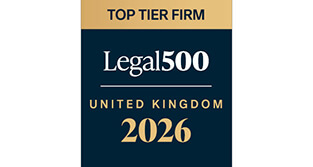Legal Horizon – May/June 2025
10th June 2025
“Welcome to the latest edition of our regular scanner, designed to keep in-house counsel and board members up to speed with the legal issues impacting businesses today and to come. In Legal Horizon, we provide bitesize highlights, so that you can quickly and easily digest the developments that really matter.”

In this edition you’ll find:
Sustainability and transparency continue as dominating themes. Working towards a circular economy and achieving integrity in carbon and nature markets are a particular focus of recent ESG developments. Supply chain responsibility and resilience remain high on board agendas, and new EU/UK and US/UK deals look to shape the legal and commercial horizon. This edition also highlights AI Growth Zones, the latest drone developments, new ‘enhanced insurance’ claims, Walker Morris’ comments on the For Women Scotland decision, and a key upcoming case on protected beliefs and characteristics.

Sustainability/ESG
The UK government has previously confirmed that the Circular Economy Taskforce will focus, as a priority, on the following 5 sectors: textiles, transport, construction, agri-food and chemicals & plastics. Following the Taskforce’s April Engagement Forum, the government is to review various strategies, including the Farming Roadmap, the Critical Minerals Strategy, the Carbon Budget Delivery Plan and the Trade Strategy, to ensure they align with the upcoming Circular Economy Strategy.
The UK Government launched its principles for voluntary carbon and nature markets integrity in November 2024. It’s now consulting, until 10 July 2025, on the implementation of those principles.
In related news, the Voluntary Carbon Markets Integrity Initiative recently launched its Scope 3 Action Code of Practice. It aims to help businesses grappling with how to deal with Scope 3 (indirect) emissions across their value chain and the issue of integrity in the voluntary carbon market.
More than 1700 villagers from Malawi are suing UK multinational Associated British Foods in the English High Court. They claim flood defences protecting a sugar plantation owned by one of its subsidiaries diverted tropical storm floodwater into their village, destroying it and killing seven people. It’s the latest in a line of cases in which the courts have considered UK parent company liability for foreign subsidiaries. See our earlier briefings for practical advice.
The Competition and Markets Authority has published informal guidance, issued to the Builders Merchants Federation, in respect of a proposed supply chain assurance initiative. Some of the key takeaways from the guidance may help other businesses seeking to implement their own sustainability/supply chain assurance initiatives.
The International Sustainability Standards Board has published an exposure draft on proposed amendments to International Financial Reporting Standard S2 (Climate-related Disclosures) (IFRS S2). Comments are to be received by 27 June 2025.

Corporate/corporate reporting
The IFRS Foundation and the Taskforce on Nature-related Financial Disclosures signed an agreement to enhance nature-related financial disclosures for capital markets.
The Companies (Directors’ Remuneration and Audit) (Amendment) Regulations 2025 (the Regulations) came into force on 11 May 2025, removing some of the directors’ remuneration requirements in the Companies Act 2006 and the Large and Medium-Sized Companies and Groups (Accounts and Report) Regulations 2008. The government has now published guidance clarifying when the Regulations apply.
The Financial Reporting Council has published the finding of its latest review of digital reporting and set out recommendations for companies on best practice.
The Serious Fraud Office has published guidance for corporates regarding self-reporting, co-operation and Deferred Prosecution Agreements in relation to corporate criminal offending.
The London Stock Exchange has published Discussion Paper: Shaping the Future of AIM, seeking feedback on proposed changes to the AIM Rules for Companies.
The Institute of Directors has launched a Commission, to examine the role of non-executive directors, and whether they truly add value to boards and governance. The Commission’s findings are due later in 2025.

Data protection/cyber security/tech and digital
The UK government has launched the formal qualifying process of its Artificial Intelligence Growth Zones (AIGZ) initiative. AIGZs intend to support the development of AI infrastructure, such as hyperscale data centres, through investment, streamlined planning and regulatory pathways, and access to power. Applications are now invited from regional and local authorities and industry. Each AIGZ application will be considered against technical and deliverability feasibility, local impact, and level of government support requested.
In a statement, the Information Commissioner’s Office has reiterated that organisations must take proactive steps to assess and mitigate risks against cyber-attacks. The statement links to detailed guidance on protecting systems from ransomware attacks, as well as lessons learned from common security mistakes.
The European Commission has launched an ambitious AI Continent Action Plan to boost the EU’s AI innovation capabilities and make it a global leader in AI. These developments will be relevant for any UK businesses operating in or trading with the EU. Regulatory simplification is a key pillar of the Action Plan. A new AI Act Service Desk will launch in summer 2025, to help businesses comply with the EU AI Act.

Commercial/general
On 19 May 2025, the UK announced that agreement had been reached on a new UK-EU deal. Details are set out in a joint statement from the parties, as well as a new Security and Defence Partnership and a Common Understanding on a renewed agenda for EU/UK cooperation. The Cabinet Office has also published a UK-EU summit explainer that will be of interest to impacted businesses.
A new US-UK Economic Prosperity Deal was announced on 8 May 2025. Key terms are explained in this Confederation of British Industry article.
President Trump’s tariffs are causing many businesses concern about the effect on their supply chain arrangements and commercial viability. Our recent briefing provides practical tips for reviewing supply chain contracts.
“With the current state of the globalisation of supply chains it is no wonder that Trump’s tariffs have caused trepidation. If nothing else the uncertainty caused serves as a reminder for businesses to understand what their supply chain arrangements require contractually and the importance of flexibility to counter any adverse impacts.”

On 30 April 2025 the Competition and Markets Authority published guidance on how it will embed pace, predictability, proportionality and process to support growth, investment and business confidence in the UK’s digital markets competition regime.
The UK Carbon Border Adjustment Mechanism (CBAM) is set to come into force from 1 January 2027. CBAM is a tax charged on the emissions embodied in certain specified goods imported into the UK. It applies to a defined list of goods and pre-cursor goods from five sectors, grouped into the following main categories: aluminium products; cement; Fertilisers; Hydrogen; and Iron and Steel Products. The government has also released a CBAM policy update and a factsheet, to provide businesses affected by CBAM with an overview of its scope and design.
Network Rail has initiated trials for ‘beyond visual line of sight’ (or (BVLOS) drone asset inspections. It’s expected that BVLOS drone technology will assist with long-range land/estate and network/infrastructure monitoring, and will facilitate quicker, safer and more efficient response to operational incidents.
The government has pledged over £20 million investment in new flight technologies, to help make commercial drone usage and electrical vertical take-off and landing (eVTOL) aircraft (or, ‘flying taxis’). The stated aim is to have an advanced aviation ecosystem which allows everyone to benefit from new technology, while tackling emissions.
For insights and practical advice in connection with drone laws and regulation, see our recent briefing.
From 14 May 2025, lettings agents will be subject to reporting and due diligence obligations over and above their money laundering regulations obligations, by virtue of financial sanctions reporting regulations. See here for information and guidance. In related news, the Office of Financial Sanctions Implementation has published its Property and Related Services Threat Assessment Report, which aims to help property sector stakeholders develop risk-based approaches to sanctions compliance.
We’ve reported previously that the London Trocadero v Picturehouse Cinemas case would be ‘one to watch’. Picturehouse claimed that Criterion arranged for its insurers to charge enhanced commission on insurance which it passed on to the tenant and then recovered via ‘insurance rent’. Picturehouse claimed that can’t be justified and should be claimed back. Picturehouse also argued that fire sprinklers in the building were turned off in 2015 because of building safety renovation works. That led to the insurer ramping up the premiums and increasing the excess to more than £1m. It claimed that tenants shouldn’t be obliged to pay insurance increases caused by fire safety issues. The High Court has now decided that the landlord wasn’t entitled to recover insurance rent corresponding to the commission it received from insurers, but it was entitled to insurance rent covering significant policy excesses imposed due to the fire safety issues.
“Landlords and tenants alike should be aware of the London Trocadero v Picturehouse Cinemas case. It’s likely to prompt a flurry of enhanced insurance claims – a new type of claim which could affect commercial and residential properties up and down the country.”


People
See our briefing on the Supreme Court’s decision in For Women Scotland Ltd v The Scottish Ministers. The case concerns the meaning of “sex”, “woman” and “man” under the Equality Act. It has implications for members of the trans community and for employers, particularly in connection with single-sex spaces, discrimination, pay-gap reporting, and diversity policies.
Another case concerning the expression of protected beliefs, Higgs v Farmor’s School, is currently the subject of an appeal to the Supreme Court. We’ll monitor and report on developments.
See our recent briefing on navigating the National Minimum Wage.
On 12 May 2025, Sir Keir Starmer announced an immigration white paper detailing proposals to reduce migration.





“AI Growth Zones are intended to unlock investment in AI-enabled data centres and support infrastructure by improving access to power and providing planning support. Successfully delivering and operating data centres also involves navigating a complex landscape of planning, energy, construction, ESG and technical challenges, as our recent briefing explains.“
Alastair Robertson, Partner, Construction & Engineering